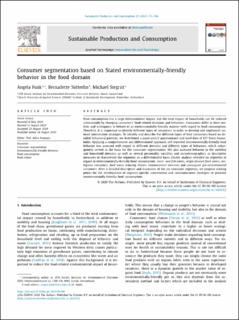Please use this identifier to cite or link to this item:
https://doi.org/10.21256/zhaw-23376Full metadata record
| DC Field | Value | Language |
|---|---|---|
| dc.contributor.author | Funk, Angela | - |
| dc.contributor.author | Sütterlin, Bernadette | - |
| dc.contributor.author | Siegrist, Michael | - |
| dc.date.accessioned | 2021-11-03T11:23:19Z | - |
| dc.date.available | 2021-11-03T11:23:19Z | - |
| dc.date.issued | 2021 | - |
| dc.identifier.issn | 2352-5509 | de_CH |
| dc.identifier.uri | https://digitalcollection.zhaw.ch/handle/11475/23376 | - |
| dc.description.abstract | Food consumption has a large environmental impact, but the total impact of households can be reduced substantially by changing consumers’ food-related decisions and behaviors. Consumers differ in their motives and willingness to behave in an environmentally-friendly manner with regard to food consumption. Therefore, it is important to identify different types of consumers in order to develop and implement tailored intervention strategies. To identify and describe the different types of food consumers based on detailed behavioral patterns, we distributed a paper-pencil questionnaire and used data of 817 Swiss households. Applying a comprehensive and differentiated approach, self-reported environmentally-friendly food behavior was assessed with regard to different domains and different types of behaviors, which subsequently served as the basis for the consumer segmentation. We also assessed behavior in the mobility and household domains as well as several personality variables and sociodemographics as descriptive measures to characterize the segments on a differentiated basis. Cluster analysis revealed six segments in regard to environmentally-friendly food consumption: meat- and fish-eaters, origin-focused food savers, ambiguous consumers, food waste reducing sharers, renouncement aversives and consequent pro-environmental consumers. After a detailed description and discussion of the six consumer segments, we propose starting points for the development of segment-specific intervention and communication strategies to promote environmentally-friendly food consumption. | de_CH |
| dc.language.iso | en | de_CH |
| dc.publisher | Elsevier | de_CH |
| dc.relation.ispartof | Sustainable Production and Consumption | de_CH |
| dc.rights | http://creativecommons.org/licenses/by-nc-nd/4.0/ | de_CH |
| dc.subject | Consumer segmentation | de_CH |
| dc.subject | Environmentally-friendly behavior | de_CH |
| dc.subject | Food consumption | de_CH |
| dc.subject | Food choice | de_CH |
| dc.subject.ddc | 333.7: Landflächen, Naturerholungsgebiete | de_CH |
| dc.subject.ddc | 658.8: Marketingmanagement | de_CH |
| dc.title | Consumer segmentation based on stated environmentally-friendly behavior in the food domain | de_CH |
| dc.type | Beitrag in wissenschaftlicher Zeitschrift | de_CH |
| dcterms.type | Text | de_CH |
| zhaw.departement | School of Engineering | de_CH |
| zhaw.organisationalunit | Institut für Nachhaltige Entwicklung (INE) | de_CH |
| dc.identifier.doi | 10.1016/j.spc.2020.08.010 | de_CH |
| dc.identifier.doi | 10.21256/zhaw-23376 | - |
| zhaw.funding.eu | No | de_CH |
| zhaw.originated.zhaw | Yes | de_CH |
| zhaw.pages.end | 186 | de_CH |
| zhaw.pages.start | 173 | de_CH |
| zhaw.publication.status | publishedVersion | de_CH |
| zhaw.volume | 25 | de_CH |
| zhaw.publication.review | Peer review (Publikation) | de_CH |
| zhaw.author.additional | No | de_CH |
| zhaw.display.portrait | Yes | de_CH |
| Appears in collections: | Publikationen School of Engineering | |
Files in This Item:
| File | Description | Size | Format | |
|---|---|---|---|---|
| 2021_Funk-etal_Consumer-segmentation_SPC.pdf | 662.14 kB | Adobe PDF |  View/Open |
Show simple item record
Funk, A., Sütterlin, B., & Siegrist, M. (2021). Consumer segmentation based on stated environmentally-friendly behavior in the food domain. Sustainable Production and Consumption, 25, 173–186. https://doi.org/10.1016/j.spc.2020.08.010
Funk, A., Sütterlin, B. and Siegrist, M. (2021) ‘Consumer segmentation based on stated environmentally-friendly behavior in the food domain’, Sustainable Production and Consumption, 25, pp. 173–186. Available at: https://doi.org/10.1016/j.spc.2020.08.010.
A. Funk, B. Sütterlin, and M. Siegrist, “Consumer segmentation based on stated environmentally-friendly behavior in the food domain,” Sustainable Production and Consumption, vol. 25, pp. 173–186, 2021, doi: 10.1016/j.spc.2020.08.010.
FUNK, Angela, Bernadette SÜTTERLIN und Michael SIEGRIST, 2021. Consumer segmentation based on stated environmentally-friendly behavior in the food domain. Sustainable Production and Consumption. 2021. Bd. 25, S. 173–186. DOI 10.1016/j.spc.2020.08.010
Funk, Angela, Bernadette Sütterlin, and Michael Siegrist. 2021. “Consumer Segmentation Based on Stated Environmentally-Friendly Behavior in the Food Domain.” Sustainable Production and Consumption 25: 173–86. https://doi.org/10.1016/j.spc.2020.08.010.
Funk, Angela, et al. “Consumer Segmentation Based on Stated Environmentally-Friendly Behavior in the Food Domain.” Sustainable Production and Consumption, vol. 25, 2021, pp. 173–86, https://doi.org/10.1016/j.spc.2020.08.010.
Items in DSpace are protected by copyright, with all rights reserved, unless otherwise indicated.